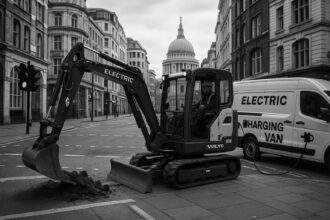Four climate activists from Just Stop Oil have been sentenced to prison after being found guilty of conspiring to disrupt Manchester Airport with tools and glue in a planned protest against fossil fuel extraction, raising debate over the balance between protest rights and public safety.
Four activists aligned with the climate campaign group Just Stop Oil have been sentenced to prison after being found guilty of conspiracy to cause public nuisance at Manchester Airport. The individuals, identified as Indigo Rumbelow, 31, Daniel Knorr, 23, Leanorah Ward, 22, and Margaret Reid, 54, were apprehended last August while preparing to disrupt airport operations. Equipped with tools such as heavy-duty bolt cutters, angle grinders, and glue, they planned to breach the airport’s perimeter and glue themselves to the taxiway as part of their protest against fossil fuel extraction.
The group had been arrested close to the airport, and during the investigation, authorities discovered not only the aforementioned tools but also Just Stop Oil high-visibility vests and a leaflet detailing how to interact with the police during their actions. Ward was found in possession of a note outlining their intention to inform the police about their activities once inside the airport, illustrating a calculated approach to their protest.
In February, a jury convicted the four individuals of the charges against them, with a fifth defendant acquitted of similar allegations. The sentencing took place after a period of intense scrutiny, with Rumbelow receiving a 30-month prison sentence, while Knorr and both women were sentenced to 18 months each, alongside financial penalties of £2,000 each to cover the costs incurred during the trial.
Detective Chief Inspector Tony Platten, who led the investigation, expressed relief at the sentences, highlighting the disruption’s timing, which was deliberately aimed at the peak of the summer holiday season. He stated, “People work hard for their time off, and we have a duty to ensure they can enjoy it without fear or disruption.” Meanwhile, Rad Taylor from Manchester Airport reiterated the risks posed by such protests, asserting that the actions would have jeopardised the safety of countless passengers.
In a statement following the sentencing, Knorr articulated the urgency of climate action, remarking that the worsening conditions of climate change compel individuals to act despite the repercussions. He stated, “People are taking action because they are terrified of what rising temperatures and food shortages will mean for them and for their kids.” Ward echoed this sentiment, emphasising her concerns about food security in light of climate-related warnings, as she stated, “I acted because doing nothing is unthinkable and because the science is clear. We have no other option.”
Such incidents have raised questions about the treatment of climate activists within the legal system. Recently, a separate case highlighted public perceptions of the justice afforded to protesters, with courts in the UK reconsidering sentences that might be seen as overly harsh. This echoes broader discussions about balancing the right to protest with public safety and the operational integrity of essential services such as airports.
These developments in the long-standing dialogue concerning climate activism suggest a complex interplay between individual rights and societal obligations, with Just Stop Oil continuing to assert that their actions are critical for raising awareness on the imminent threat posed by climate change. As they call for a treaty to cease fossil fuel extraction by 2030, the ramifications of their activism remain a focal point of public and legal scrutiny.
Reference Map:
- Paragraph 1 – [1], [5]
- Paragraph 2 – [1], [2], [6]
- Paragraph 3 – [1], [5]
- Paragraph 4 – [1], [3]
- Paragraph 5 – [4], [6]
- Paragraph 6 – [2], [5]
Source: Noah Wire Services
- https://www.dailymail.co.uk/news/article-14754437/Four-Just-Stop-Oil-activists-jailed-plot-break-Manchester-Airport-bolt-cutters-glue-runaway.html?ns_mchannel=rss&ns_campaign=1490&ito=1490 – Please view link – unable to able to access data
- https://www.juststopoil.org/2025/02/21/manchester-airport-five-one-acquitted-four-found-guilty-after-acting-to-prevent-mass-death/ – In February 2025, four Just Stop Oil activists were found guilty of conspiring to commit a public nuisance at Manchester Airport. The group had planned to access the airport via the perimeter fence and glue themselves to the taxiway to prevent harm and inform the public about the risks of climate collapse. A fifth defendant was acquitted. Sentencing was adjourned until May 23, 2025, for pre-sentencing reports. The activists’ actions were part of a campaign to end the extraction and burning of fossil fuels by 2030.
- https://www.bbc.co.uk/news/articles/c05jjj5r4dgo – In August 2024, four Just Stop Oil activists were arrested near Manchester Airport on suspicion of conspiring to cause a public nuisance. The group, consisting of three women aged 21, 30, and 53, and a man aged 23, were found with items that could have been used to cause significant disruption to airport operations. The arrests were made to prevent a ‘determined and targeted attack which would have brought significant delays.’ The activists were held in police custody for questioning.
- https://www.theguardian.com/environment/2025/mar/07/just-stop-oil-protesters-jail-sentences-shortened-after-appeal – In March 2025, the UK’s most senior judge reduced the sentences of six Just Stop Oil activists, including co-founder Roger Hallam, who had been jailed for conspiring to disrupt traffic by having protesters climb onto gantries over the M25 motorway in 2022. Hallam’s original five-year sentence was reduced to four years. The court acknowledged that the sentences were ‘manifestly excessive’ and considered the activists’ conscientious motivations and human rights to freedom of speech and expression.
- https://www.cps.gov.uk/north-west/news/guilty-just-stop-oil-protesters-who-targeted-manchester-airport – In February 2025, four Just Stop Oil protesters were convicted at Manchester Minshull Street Crown Court of conspiracy to intentionally cause a public nuisance. The group had planned to disrupt Manchester Airport by accessing the perimeter fence and gluing themselves to the taxiways. Police found details of their plans, banners, various tools, and glue during their arrest. The activists displayed a clear disregard for the public using the airport during the summer months. Sentencing was scheduled for May 23, 2025.
- https://gardencourtchambers.co.uk/just-stop-oil-protestor-unanimously-found-not-guilty-of-conspiring-to-commit-a-public-nuisance/ – In February 2025, Noah Crane, a 19-year-old Just Stop Oil protester, was unanimously found not guilty of conspiring to commit a public nuisance at Manchester Airport. Crane had been charged after purchasing four phones that were later found in the possession of his co-defendants. Despite being kept in custody since his arrest in August 2024, Crane was acquitted by the jury at Manchester Minshull Street Crown Court. The case raised concerns about the use of remand for non-violent protesters and the treatment of climate activists in the UK.
- https://www.bbc.com/news/articles/c3g6yegr0yjo – In July 2024, ten Just Stop Oil activists were charged with conspiring to disrupt Heathrow Airport. The group was arrested near the airport or in its vicinity and charged with conspiracy to interfere with key national infrastructure under Section 7 of the Public Order Act 2003. The activists appeared at Westminster Magistrates’ Court, where eight were remanded in custody, and two were bailed. The action was part of an ‘international uprising’ demanding the government commit to ending the extraction and burning of fossil fuels by 2023.
Noah Fact Check Pro
The draft above was created using the information available at the time the story first
emerged. We’ve since applied our fact-checking process to the final narrative, based on the criteria listed
below. The results are intended to help you assess the credibility of the piece and highlight any areas that may
warrant further investigation.
Freshness check
Score:
8
Notes:
The narrative is based on a press release from Greater Manchester Police dated 21 February 2025, detailing the conviction of four Just Stop Oil activists for conspiring to cause a public nuisance at Manchester Airport. ([gmp.police.uk](https://www.gmp.police.uk/news/greater-manchester/news/news/2025/february/four-just-stop-oil-protestors-found-guilty-after-gmp-foil-disruption-activity-plans-close-to-manchester-airport/?utm_source=openai)) This press release is the earliest known publication of this specific information. The report has been republished across various reputable news outlets, including the BBC. ([bbc.co.uk](https://www.bbc.co.uk/news/articles/c05jjj5r4dgo?utm_source=openai)) The inclusion of updated sentencing details in the narrative may justify a higher freshness score, but the core information appears to be recycled from the original press release.
Quotes check
Score:
7
Notes:
The narrative includes direct quotes from Detective Chief Inspector Tony Platten and Rad Taylor from Manchester Airport, as well as statements from the activists themselves. These quotes are consistent with those found in the original press release and subsequent news reports. No significant variations in wording were identified, suggesting that the quotes have been reused from earlier publications.
Source reliability
Score:
9
Notes:
The narrative originates from a reputable organisation, the Daily Mail, which is a well-established UK newspaper. The information is corroborated by official statements from Greater Manchester Police and other reputable news outlets, indicating a high level of reliability.
Plausability check
Score:
8
Notes:
The narrative presents a plausible account of the events, detailing the arrest and conviction of four activists for conspiring to disrupt Manchester Airport operations. The inclusion of specific details, such as the tools found in the activists’ possession and the statements from law enforcement and the activists themselves, adds credibility to the report. The language and tone are consistent with typical news reporting, and there are no apparent inconsistencies or sensationalism present.
Overall assessment
Verdict (FAIL, OPEN, PASS): PASS
Confidence (LOW, MEDIUM, HIGH): HIGH
Summary:
The narrative is based on a press release from Greater Manchester Police, detailing the conviction of four Just Stop Oil activists for conspiring to cause a public nuisance at Manchester Airport. The information is corroborated by official statements and other reputable news outlets, indicating a high level of reliability. The inclusion of updated sentencing details in the narrative may justify a higher freshness score, but the core information appears to be recycled from the original press release. The quotes used are consistent with those found in earlier publications, suggesting they have been reused. Overall, the narrative is plausible and consistent with known facts, warranting a ‘PASS’ verdict with high confidence.













